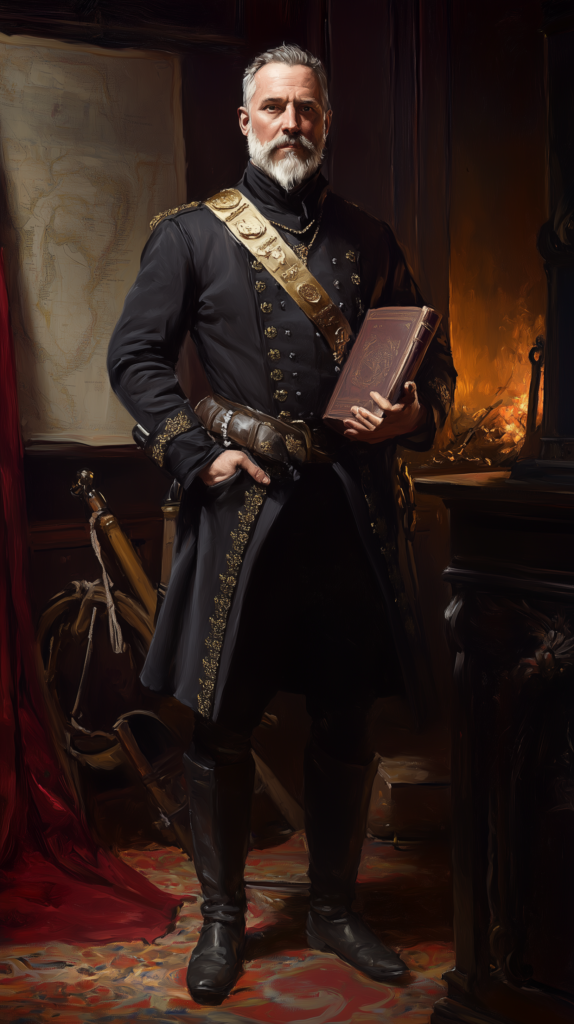Captain Daniel Tucker: The Relentless Pioneer of Colonial Survival
“Meet Captain Daniel Tucker: The Ruthless Colonial Governor Who Ruled with an Iron Fist and Shaped Bermuda’s Future!”

- Alias – None recorded
- Gender – Male
- Race – Human
- Occupation – Mariner, Colonial Governor, Planter
- Religion – Likely Christian (Anglican)
- Allies – English settlers, Virginia Company, Bermuda settlers
- Enemies – Disobedient settlers, criminal elements in the colonies, possibly local indigenous tribes
- Abode/ Base of operations – Jamestown Colony (Virginia), Bermuda (Somers Isles)
- Nationality – English
- Languages – English
- Alignment – Lawful Neutral (focused on order, survival, and discipline)
- Affiliation(s) – Virginia Council, Virginia Colony, Bermuda Colony, English Crown
- Significant others – No known significant other documented
Captain Daniel Tucker was a steadfast leader during the early days of English colonization, renowned for his discipline, ambition, and pragmatic—sometimes ruthless—approach. As a key figure in the survival and development of both the Jamestown Colony in Virginia and the Bermuda settlement, Tucker’s leadership was forged in the crucible of hardship. His life story is a narrative of endurance, driven by a fear of failure and a determination to build a stable future in a harsh, unforgiving world.
Early Life and Maritime Beginnings
Daniel Tucker’s early life in England remains somewhat obscure, but it is likely that he grew up during an age when maritime exploration was rapidly expanding England’s influence across the globe. His career as a mariner gave him a firsthand understanding of the dangers of long voyages, where food shortages, disease, and shipwrecks could turn any journey into a fight for survival. This background shaped his hard-nosed character, preparing him for the challenges that lay ahead in the New World.
As an experienced sailor, Tucker would have been drawn to the promise of adventure and opportunity in the American colonies. This desire for both wealth and glory through exploration was common among many men of his time, but unlike others, Tucker’s determination to succeed would leave an indelible mark on the early history of English colonization.
Role in the Jamestown Colony
Tucker’s path took him to the Jamestown Colony, the first permanent English settlement in North America, at a time when the colony was on the verge of collapse. Starvation, disease, and strained relations with the local Native American tribes had left the settlers weak and demoralized. Many had died during a particularly harsh period of famine, and those who survived were struggling to maintain the colony’s fragile existence.
It was in this desperate environment that Tucker’s iron will came to the forefront. His leadership style was uncompromising, marked by strict discipline and a firm hand. Every colonist, no matter their rank or status, was expected to contribute to the community’s survival. When food was scarce, Tucker enforced harsh punishments on anyone caught stealing supplies. One infamous account tells of Tucker hanging a man for stealing food, a stark example of the severity with which he ruled.
Tucker’s fear of failure drove him to these extremes. He had seen how quickly a colony could unravel, and his greatest fear was watching the settlement disintegrate due to disobedience or lack of discipline. His reputation as a tough leader was well-earned, but it was also instrumental in pulling Jamestown back from the brink. Through his efforts to enforce order and focus on agriculture, the colony slowly regained its footing.
Governor of Bermuda: Shaping a New Frontier
After his time in Virginia, Tucker took on the role of Governor of Bermuda, a newly settled island that had great potential as a strategic outpost for England’s growing empire. Bermuda, also known as the Somers Isles, had been claimed after a shipwreck led to its accidental discovery. It was envisioned as a vital supply point for the English colonies, particularly Jamestown, but like many other early settlements, it struggled with internal disputes, food shortages, and a lack of agricultural development.
Tucker arrived in Bermuda determined to turn the struggling settlement into a thriving colony. Drawing on his experience in Virginia, he imposed strict rules to ensure that the settlers worked hard and produced the food and supplies necessary for their survival. Tobacco cultivation became a central focus under his leadership, setting the stage for Bermuda’s future economic success.
Once again, Tucker’s leadership was authoritarian. He had little tolerance for laziness or dissent, punishing those who refused to work or challenged his authority. He viewed these behaviors as threats to the colony’s success, knowing all too well that failure to enforce discipline could lead to chaos and ruin.
However, his tenure as governor was undeniably effective. By the time he left Bermuda, the colony was stable and growing. Tucker had established the island as an important part of England’s colonial network, and Bermuda became a vital supply hub for other settlements in the New World.
Character: Fear, Ambition, and Leadership
Captain Daniel Tucker was shaped by the harsh realities of colonial life. His experiences on the sea and in the early colonies gave him a deep understanding of how fragile survival could be. He was a man driven by both fear and ambition. His fear of failure, of watching the colonies fall apart as so many had before, led him to embrace a leadership style that was rigid, often cruel. Yet, at the heart of his actions was a desire to see these settlements thrive and become self-sustaining.
Tucker’s worldview was informed by the belief that weakness or disobedience could spell the end for any colony. He had seen the dangers of disorganization firsthand, and he knew that without a strong hand guiding the settlers, chaos could quickly take hold. His insistence on discipline and productivity stemmed from this fear, but it was also driven by his ambition to build a lasting legacy. He wanted to leave behind a successful colony, one that would contribute to the growing English empire.
In many ways, Tucker was a complex figure. His ruthless methods were necessary for the survival of the colonies, yet they made him a feared and often disliked leader. His character was a mixture of pragmatism, ambition, and an iron will, shaped by the brutal circumstances in which he lived.
Captain Daniel Tucker

Medium humanoid (human), lawful neutral
Armor Class 17 (Breastplate, +2 Dexterity)
Hit Points 130 (20d8 + 40)
Speed 30 ft.
| STR | DEX | CON | INT | WIS | CHA |
|---|---|---|---|---|---|
| 18 (+4) | 16 (+3) | 14 (+2) | 15 (+2) | 13 (+1) | 12 (+1) |
Saving Throws Dexterity +7, Constitution +6, Wisdom +5
Skills Athletics +8, Insight +5, Intimidation +5, Perception +5
Damage Resistances Poison
Senses passive Perception 15
Languages Common, Elvish, Draconic
Challenge 8 (3,900 XP)
Proficiency Bonus +4
Traits
Leadership. As a bonus action, Captain Tucker can grant a willing ally within 30 feet a +2 bonus to attack rolls, saving throws, and ability checks for 1 minute. This ability can be used three times per long rest.
Tactical Command. Captain Tucker can use his action to direct his allies. All allies within 30 feet who can hear him can use their reaction to make a single weapon attack or move up to their speed.
Actions
Multiattack. Captain Tucker makes three attacks with his Cutlass.
Cutlass. Melee Weapon Attack: +8 to hit, reach 5 ft., one target. Hit: 10 (1d8 + 6) slashing damage.
Blunderbuss. Ranged Weapon Attack: +7 to hit, range 10/30 ft., one target. Hit: 14 (2d10 + 3) piercing damage. On a miss, the attack deals half damage in a 5-foot radius around the target.
Tactical Strike (Recharge 5–6). Captain Tucker can use his action to make a single attack with advantage. If the attack hits, it deals an additional 14 (4d6) damage and the target must succeed on a DC 16 Constitution saving throw or be stunned until the end of Captain Tucker’s next turn.
Commanding Shout (Recharge 5–6). As an action, Captain Tucker can shout a commanding order. All creatures of his choice within 30 feet must make a DC 16 Wisdom saving throw. On a failed save, they are frightened for 1 minute. A frightened target can repeat the saving throw at the end of each of its turns, with disadvantage if Captain Tucker is within line of sight, ending the effect on itself on a success.
Reactions
Parry. Captain Tucker adds 4 to his AC against one melee attack that would hit him. To do so, Captain Tucker must see the attacker and be wielding a melee weapon.
Riposte. When a creature misses Captain Tucker with a melee attack, he can use his reaction to make a melee weapon attack against the creature.
Legendary Actions
Captain Tucker can take 3 legendary actions, choosing from the options below. Only one legendary action option can be used at a time and only at the end of another creature’s turn. Captain Tucker regains spent legendary actions at the start of his turn.
Command Ally. Captain Tucker directs one ally within 30 feet to take an action.
Tactical Strike (Costs 2 Actions). Captain Tucker makes one attack with advantage. If the attack hits, it deals an additional 14 (4d6) damage.
Unyielding Assault (Costs 3 Actions). Captain Tucker makes two attacks with his Cutlass and uses Tactical Strike.
Equipment
Breastplate of Resistance (Custom). Grants resistance to poison damage.
Cutlass. A finely crafted weapon with a curved blade, giving Captain Tucker an advantage in close combat.
Blunderbuss. A powerful, short-range firearm suitable for close quarters and crowd control.
Tactical Map. A magical map that allows Captain Tucker to reroll any attack roll, saving throw, or ability check once per day.
Explorer’s Pack. Contains essential adventuring gear like a bedroll, rations, and a rope.
Naval Officer’s Uniform. Provides a +2 bonus to Charisma (Intimidation) checks and a +1 bonus to AC while worn.

 Buy me a coffee
Buy me a coffee